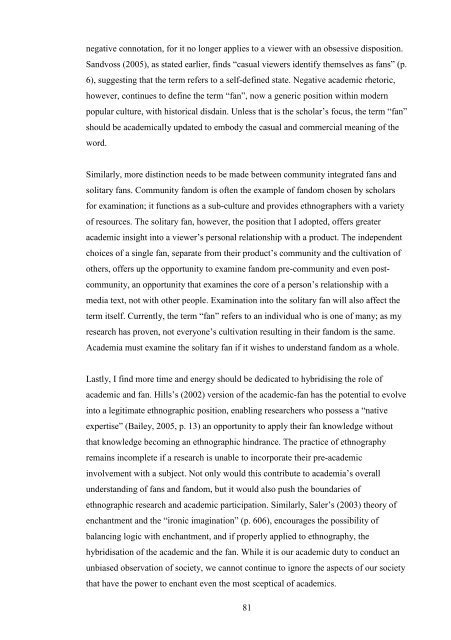The Case Study of Sherlock Holmes (2009) - Scholarly Commons ...
The Case Study of Sherlock Holmes (2009) - Scholarly Commons ...
The Case Study of Sherlock Holmes (2009) - Scholarly Commons ...
You also want an ePaper? Increase the reach of your titles
YUMPU automatically turns print PDFs into web optimized ePapers that Google loves.
negative connotation, for it no longer applies to a viewer with an obsessive disposition.<br />
Sandvoss (2005), as stated earlier, finds “casual viewers identify themselves as fans” (p.<br />
6), suggesting that the term refers to a self-defined state. Negative academic rhetoric,<br />
however, continues to define the term “fan”, now a generic position within modern<br />
popular culture, with historical disdain. Unless that is the scholar‟s focus, the term “fan”<br />
should be academically updated to embody the casual and commercial meaning <strong>of</strong> the<br />
word.<br />
Similarly, more distinction needs to be made between community integrated fans and<br />
solitary fans. Community fandom is <strong>of</strong>ten the example <strong>of</strong> fandom chosen by scholars<br />
for examination; it functions as a sub-culture and provides ethnographers with a variety<br />
<strong>of</strong> resources. <strong>The</strong> solitary fan, however, the position that I adopted, <strong>of</strong>fers greater<br />
academic insight into a viewer‟s personal relationship with a product. <strong>The</strong> independent<br />
choices <strong>of</strong> a single fan, separate from their product‟s community and the cultivation <strong>of</strong><br />
others, <strong>of</strong>fers up the opportunity to examine fandom pre-community and even post-<br />
community, an opportunity that examines the core <strong>of</strong> a person‟s relationship with a<br />
media text, not with other people. Examination into the solitary fan will also affect the<br />
term itself. Currently, the term “fan” refers to an individual who is one <strong>of</strong> many; as my<br />
research has proven, not everyone‟s cultivation resulting in their fandom is the same.<br />
Academia must examine the solitary fan if it wishes to understand fandom as a whole.<br />
Lastly, I find more time and energy should be dedicated to hybridising the role <strong>of</strong><br />
academic and fan. Hills‟s (2002) version <strong>of</strong> the academic-fan has the potential to evolve<br />
into a legitimate ethnographic position, enabling researchers who possess a “native<br />
expertise” (Bailey, 2005, p. 13) an opportunity to apply their fan knowledge without<br />
that knowledge becoming an ethnographic hindrance. <strong>The</strong> practice <strong>of</strong> ethnography<br />
remains incomplete if a research is unable to incorporate their pre-academic<br />
involvement with a subject. Not only would this contribute to academia‟s overall<br />
understanding <strong>of</strong> fans and fandom, but it would also push the boundaries <strong>of</strong><br />
ethnographic research and academic participation. Similarly, Saler‟s (2003) theory <strong>of</strong><br />
enchantment and the “ironic imagination” (p. 606), encourages the possibility <strong>of</strong><br />
balancing logic with enchantment, and if properly applied to ethnography, the<br />
hybridisation <strong>of</strong> the academic and the fan. While it is our academic duty to conduct an<br />
unbiased observation <strong>of</strong> society, we cannot continue to ignore the aspects <strong>of</strong> our society<br />
that have the power to enchant even the most sceptical <strong>of</strong> academics.<br />
81

















